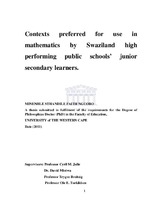| dc.contributor.advisor | Julie, Cyril M. | |
| dc.contributor.advisor | Mtetwa, David | |
| dc.contributor.advisor | Breiteig, Trygve | |
| dc.contributor.advisor | Torkildsen, Ole Einar | |
| dc.contributor.author | Ngcobo, Minenhle Sthandile Faith | |
| dc.contributor.other | NULL | |
| dc.contributor.other | Faculty of Education | |
| dc.date.accessioned | 2014-01-15T14:01:13Z | |
| dc.date.available | 2011/06/07 11:02 | |
| dc.date.available | 2011/06/07 | |
| dc.date.available | 2014-01-15T14:01:13Z | |
| dc.date.issued | 2011 | |
| dc.identifier.uri | http://hdl.handle.net/11394/2579 | |
| dc.description | Philosophiae Doctor - PhD | en_US |
| dc.description.abstract | At primary school learners are excited about mathematics. This may be an indication that learning related to familiar contexts, connected to the learners’ interests, values and goals is necessary for motivation. At secondary school level learners begin to question the applicability of certain topics in the school syllabus and sometimes do not see the necessity of mathematics in their future careers. This is an indication that they are apprehensive regarding
the relevance of mathematics in various contexts. However, relevance has a point of reference, what is relevant to a teacher is not necessarily relevant to the learner and what is relevant to a text book writer might not be relevant to the text book reader. As mathematics educators endeavour to encourage learners to appreciate the relevance of mathematics to everyday life, it is important to be aware of their interests. It is crucial to be informed on the subject areas they desire to know about in order to plan classroom activities
that will occupy them in purposeful activity.Usually contexts for learning are chosen by adults without conferring with learners at any point. The present study investigated learners' preferences for contexts to use in learning school mathematics. Furthermore the study sought to establish motivations learners have for preferring particular contexts. The problem the study addressed was that of absence of learners' contribution in contexts used to learn mathematics. The aim was to find out the contexts learners preferred and the reasons they gave for their preferences. It is important to be aware of learners' preferences when choosing contexts to use in teaching. Preferences improve motivation and learning. Furthermore, consulting them sends a message that they matter and have an important role to play in their education. | en_US |
| dc.language.iso | en | en_US |
| dc.publisher | University of the Western Cape | en_US |
| dc.subject | Contexts | en_US |
| dc.subject | Interest | en_US |
| dc.subject | Learners' views | en_US |
| dc.subject | Identity | en_US |
| dc.subject | Generalised Others | en_US |
| dc.subject | Mathematics | en_US |
| dc.subject | Study and teaching (Secondary) | en_US |
| dc.subject | Swaziland | en_US |
| dc.title | Contexts preferred for use in mathematics by Swaziland high performing public schools' junior secondary learners | en_US |
| dc.type | Thesis | en_US |
| dc.rights.holder | University of the Western Cape | en_US |
| dc.description.country | South Africa | |

